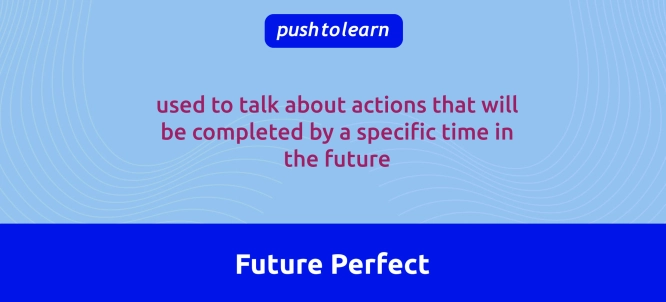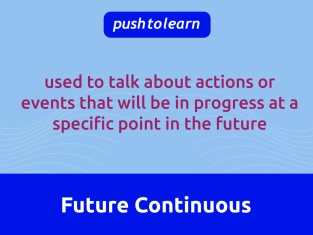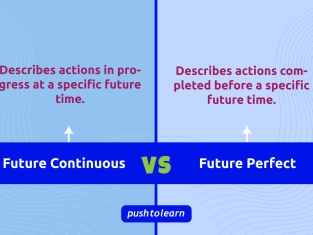by PushtoLearn
Futuro perfecto en inglés
Tabla de contenidos
Futuro perfecto – Ejercicios
Estos ejercicios se enfocan en el futuro perfecto.
¿Qué es el tiempo futuro perfecto?
El tiempo futuro perfecto enfatiza que una acción se habrá terminado antes de un punto específico en el futuro. Se enfoca en la finalización de la acción más que en su duración.
Ejemplos:
-
By 8 PM, I will have finished my homework.
-
She will have left the office before the meeting starts.

Reglas para usar el futuro perfecto
Estructura
Para formar el futuro perfecto, sigue esta estructura:
Sujeto + will + have + participio pasado (verbo en tercera forma)
|
Tipo de oración |
Estructura |
Ejemplo |
|
Afirmativa |
Sujeto + will + have + participio pasado |
I will have completed the project by 5 PM. |
|
Negativa |
Sujeto + will not (won’t) + have + participio |
She won’t have arrived by then. |
|
Interrogativa |
Will + sujeto + have + participio pasado? |
Will they have finished the report? |
Marcadores de tiempo
El futuro perfecto suele usar expresiones de tiempo como:
-
By (ej. by tomorrow, by 2025)
-
Before (ej. before noon, before the event starts)
-
In (ej. in two years, in a week)
Cuándo usarlo
-
Para describir una acción que se completará para un momento específico:
-
By next month, I will have saved enough money for the trip.
-
He will have graduated by 2024.
- Para describir una acción que se completará antes de otra acción futura:
-
She will have cooked dinner before they arrive.
-
The guests will have left by the time we get home.
Errores comunes
-
Olvidar usar "have" en la estructura
-
Incorrecto: They will finished their work.
-
Correcto: They will have finished their work.
-
Usar una forma verbal incorrecta
-
Incorrecto: I will have finish the report.
-
Correcto: I will have finished the report.
-
Confundirlo con el futuro continuo
-
Incorrecto: By 8 PM, I will be completing my homework.
-
Correcto: By 8 PM, I will have completed my homework.
-
Usar "by" incorrectamente
-
Incorrecto: I will have left until 6 PM.
-
Correcto: I will have left by 6 PM.
Usos cotidianos del futuro perfecto
-
En el trabajo
"By next Friday, we will have submitted the final report."
"Will the team have completed the project on time?" -
En casa
"I will have cleaned the house before the guests arrive."
"They won’t have cooked dinner by the time we get home." -
En situaciones sociales
"By the time we meet again, she will have moved to another city."
"In two years, I will have traveled to several countries."
Comparación con el futuro simple y el futuro continuo
|
Tiempo verbal |
Enfoque principal |
Ejemplo |
Uso común |
|
Futuro simple |
Acción única en el futuro |
I will finish my homework tomorrow. |
Promesas o decisiones |
|
Futuro continuo |
Acción en curso en el futuro |
I will be finishing my homework tomorrow. |
Planes o interrupciones |
|
Futuro perfecto |
Acción completada antes de un momento futuro |
I will have finished my homework by tomorrow. |
Fechas límite o plazos |
FAQ
¿Para qué se usa el tiempo futuro perfecto?
Se usa para describir acciones que se habrán completado antes de un momento o evento específico en el futuro.
¿Cómo se forma una oración en futuro perfecto?
Se usa la estructura: Sujeto + will + have + participio pasado.
¿Puedo usar contracciones con el futuro perfecto?
¡Sí! Por ejemplo:
"I’ll have finished the book by tomorrow."
"She won’t have arrived by the time we leave."
¿Cuál es la diferencia entre el futuro perfecto y el futuro continuo?
El futuro perfecto habla de acciones que ya estarán completadas, mientras que el futuro continuo se enfoca en acciones que estarán en curso.
-
Future Perfect: "I will have eaten dinner by 7 PM."
-
Future Continuous: "I will be eating dinner at 7 PM."
¿Cómo usar "by" y "before" en el futuro perfecto?
Usa "by" para establecer un plazo o momento específico, y "before" para referirse a un evento anterior.
-
"I will have finished the task by noon."
-
"She will have cleaned the room before the guests arrive."

